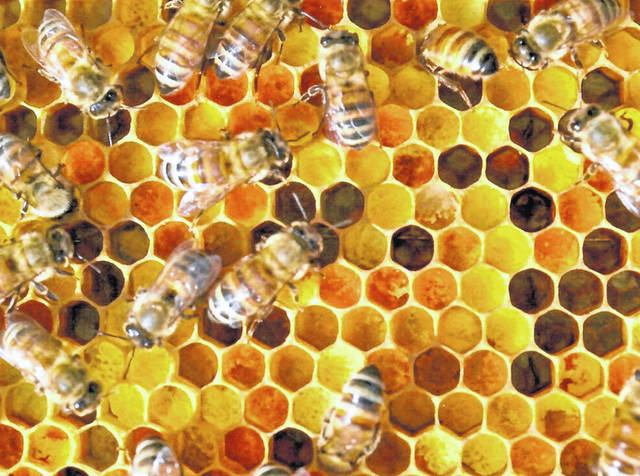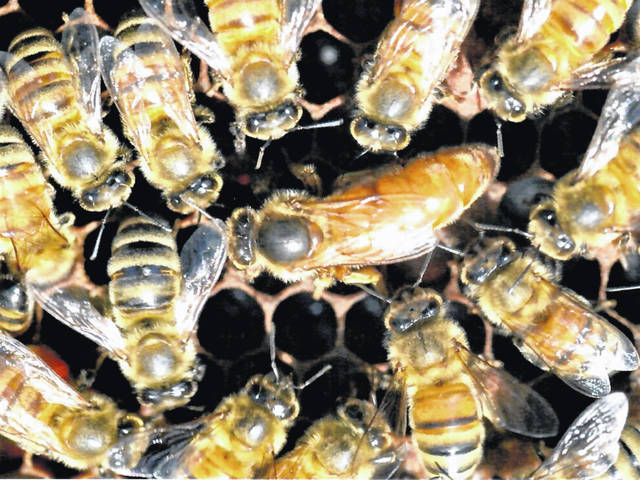

EATON — September is National Honey Month, and local beekeeper Gary Duke, an Eaton resident whose family has been in the area for over four generations, is raising awareness for the impact that honeybees have on our lives.
According to Duke, honeybees produce the only food source made by insects that humans can eat, and that they are responsible for 80 percent of the fruits, vegetables and sweet seed crops in the United States, a total of over $14 billion.
To help provide our food, honeybees will fly up to 15 miles per hour and beat their wings 11,400 times per minute, traveling up to three miles from their hive and visiting 50-100 flowers to collect nectar.
That nectar is then returned to the hive, broken down and stored into hexagonal honeycombs where beekeepers can then collect the honeycombs and place them into an extractor to collect honey, according to the National Honey Board.
“My great-grandfather used to tell me that he could put honey on a cut and it would help heal it,” Duke said.
For Duke, his work as a beekeeper balances the delicate responsibility of ensuring that he collects enough honey for his business while not taking too much from the hive that will depend on honey for survival during the winter.
All of this, of course, is dependent on weather, as a rainy day could be deadly for honeybees if they are free to roam.
“You never want to rob them of too much honey, because that immediately could possibly threaten their life in the wintertime if they starve to death,” he said. “There’s really no excuse for doing that to a commercial beehive. We usually leave 60 pounds of honey on them, at least, to make it through the winter.”
In the winter, Duke said that honeybees will cluster in the middle of the hive, as body heat is the only way for cold-blooded insects to maintain heat.
Honeybees on the inside of the cluster will curl out and those on the outside will crawl in, all with the goal in mind of surviving the winter.
“It’s amazing how they make it through some of these winters,” Duke said.
It may be surprising to see how important honeybees are to the average person, and it is equally shocking to hear about some of the issues honeybees face right now.
“Currently, there’s what they call colony collapse disorder, and it’s taking a toll on the beehives across the country – across the world, really,” Duke said. “They also can get two different kinds of foulbrood, which attacks the larvae and eventually it dies down the hive.”
According to the Environmental Protection Agency, colony collapse disorder (CCD) occurs when the majority of worker bees in a colony disappear.
While CCD has not had the same devastating impact in recent years with honey-producing colonies in the United States up four percent in 2018 to 2.8 million, according to the USDA, it is still an impactful problem with no agreed upon cause.
Even with the issues that bees are facing, Duke said there ways for people to help honeybees even if they aren’t a beekeeper.
If you come across a swarm of honeybees, which can average around 2-3 pounds at 10,000 bees per pound, call the police or fire department and they’ll direct you to get help.
“You don’t get out Black Flag or any kind of insect killer to spray them for several reasons,” Duke said. “If it doesn’t kill them instantly, if they have any of that on them, and a beekeeper comes along and puts them in a wooden hive, that chemical can attach itself to the wood, and then anytime that you ever put any more bees in there, you could destroy them and kill them.”
Furthermore, Duke said if you have to spray pesticides, try to do it in the evening so honeybees are not still out collecting nectar.
Planting trees such as black locusts can also help to increase the number of sources for pollination to take place.
“Finding that list of plants via the Internet are helpful to honeybees,” Duke said. “[The Preble County Soil and Water Conservation District] provides seeds, what they call a nature pack, and it has several different varieties of seeds in it, and they all are for pollinators.”
Duke said that people should take a little time to consider what honeybees do not only for each of us, but for the world.
“My point is, if they just take a moment to see what that little six-legged bug can do to help everyone for the benefit of all, it’s such an important thing,” he said. “The next time they see one, just remember not to take a fly swatter and hit it or anything else. They don’t bother you if you don’t bother them, and they just go about their business as they have been made to do.”



